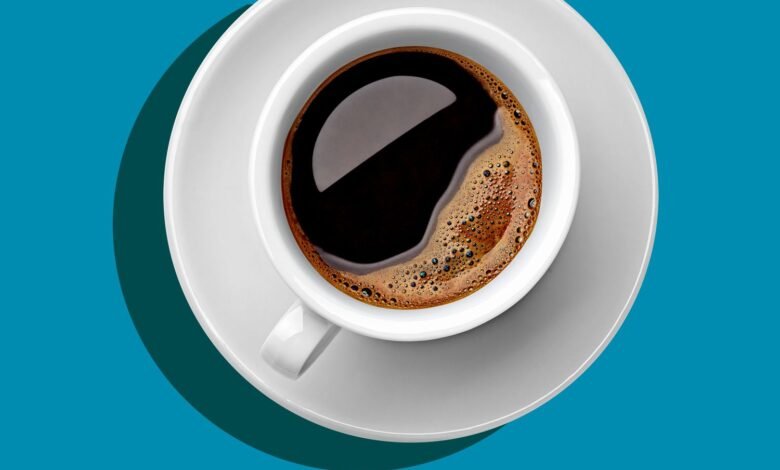Decoding Caffeine: How Much is Too High?

Introduction
Caffeine is more than just a morning jolt. It’s often what keeps us going. But how well do we know it? This post unearths all there is to know about caffeine. Get ready to learn about its sources, impacts, safe limits, and how to spot excess. I can’t wait to help you keep your caffeine habits in check. Ready for a cup of facts (maybe decaf)?

Sources of Caffeine
1. Coffee and Coffee Drinks
Everyone knows coffee is packed with caffeine. A typical eight-ounce cup provides around 92–100 mg. But let’s not forget that brewing methods and coffee types can affect it.
2. Teas and Sodas
Black and green tea also carry a dose of caffeine. As do sodas, mostly cola ones. Thinking about their caffeine content? They have 30 to 50 mg and 35 to 45 mg, respectively.
3. Chocolate and other food products
Love chocolate chip cookies or dark chocolate? These sweet delights have their share of caffeine too. Breakfast cereals, ice creams, and some medications might carry traces of caffeine as well.
4. Energy Drinks
Energy drinks keep you up and running. But they can load you with 70 to 200 mg of caffeine per serving. Plus, they are often mixed with other stimulants.
| Beverages | Average Caffeine Content per Serving |
|---|---|
| Coffee (8 oz) | 92-100 mg |
| Tea (8 oz) | 30-50 mg |
| Soda (12 oz) | 35-45 mg |
| Energy Drinks (varies) | 70-200 mg |
In the course of my practice, I have found that it is important to be aware of your caffeine intake, as it often starts in childhood and continues to increase in adulthood. Initially, caffeine may be consumed in small amounts along with soda and cold coffee, but as you grow older, you may start including higher-caffeine beverages like coffee and energy drinks. It is crucial to monitor your caffeine consumption, as excessive intake can have potential effects on your health and well-being.
Understanding the Effects of Caffeine
Wondering what caffeine does after you consume it?
- Alertness: We love caffeine because it fights sleepiness and keeps us active. It does this by blocking sleep-promoting receptors in our brains.
- Mood Elevator: Moderate caffeine intake may lift mood and cut the risk of depression.
- Enhanced Performance: Not only mental alertness, but caffeine can also increase physical performance by breaking down fats and boosting stamina.
Did you know?
- Roughly 80% of U.S. adults consume caffeine every day. (source: CDC)
- The effects of caffeine take about 30 minutes to kick in and can last for 5 to 6 hours. (source: CDC)
- The FDA recommends a maximum daily caffeine intake of 400 milligrams for healthy adults. (source: FDA)
- Caffeine overdose can be observed with rapid consumption of around 1,200 milligrams of caffeine. (source: FDA)
- Decaffeinated coffee and tea still contain some caffeine, typically ranging from 2–15 milligrams per 8-ounce cup. (source: FDA)
Understand the Caffeine Limit
Our reaction to caffeine varies. Hence, knowing your balance matters.
Recommended Daily Intake: The maximum daily caffeine dose for most adults is 400 mg. That’s about four cups of coffee, two energy shots, or 10 cans of cola. But for would-be moms or those trying, it’s safe to stick to 200 mg.
Factors Determining Individual Caffeine Limits
- Health and Age: Your overall health, weight, age, metabolic rate, and genes. They all decide your caffeine limit.
- Specific Physiological Conditions: Certain health issues can make you more sensitive to caffeine. Anxiety, heart disease, high BP, and pregnancy are a few. It’s always better to talk to a healthcare provider before adding caffeine to your diet in these cases.
- Sleep Cycle: Caffeine can upset your sleep pattern. This can lower daytime alertness. Struggling to get sleep? Try reducing caffeine.
From what I’ve seen, it’s important to be careful with caffeine during pregnancy. I’ve observed that caffeine stays in the body longer than usual, which means it affects both you and your baby for a prolonged duration. Since caffeine can potentially impact brain development, it’s best to consider this and limit your caffeine intake during pregnancy.
Examples of High Caffeine Intake
What does a high caffeine intake look like? It could be closer than you think.
- One 16-ounce energy drink? Up to 200 mg of caffeine
- A shot of espresso at your go-to café? 63 to 126 mg of caffeine.
- Four 1.5-ounce packs of chocolate-covered coffee beans? Around 336 mg of caffeine
Here’s a snapshot of the high caffeine content in common foods and drinks:
| Food and Beverage | Average Caffeine Content |
|---|---|
| Energy drink (16 oz) | 200 mg |
| Espresso (1 shot) | 63-126 mg |
| Chocolate covered coffee beans (6 oz) | 336 mg |
Based on what I’ve seen, caffeine can positively affect both objective and perceived cognitive performance. It works by increasing alertness and wakefulness, which can enhance your mental focus and attention. Additionally, consuming caffeine in the short term has been shown to improve performance on memory tasks. However, it’s important to keep in mind that individual responses to caffeine may vary, and it’s best to find the right balance that works for you.
Signs of Excessive Caffeine Intake
D
Too much caffeine does no good. It can leave you with unpleasant symptoms. Physical signs can tell you if your coffee habit is getting out of hand.
- Anxiety: Small amounts of caffeine wake you up. But high doses can make you anxious or jittery.
- Insomnia: Caffeine can disturb your sleep cycle. This can disrupt sleep and release extra wakefulness.
- Digestive Issues: Large caffeine doses can result in stomach ulcers, acid reflux, and heartburn.
- Muscle Breakdown: Rhabdomyolysis—extreme muscle breakdown—is rare but can occur due to large amounts of caffeine.
- High Blood Pressure: Long-term heavy caffeine can lead to high BP.
- Increased Heart Rate: Caffeine can also fasten your heartbeat, which can have harmful effects such as changes in heart rhythm.
- Fatigue: A regular caffeine dose will keep you alert. However, over time, it can cause insomnia and daytime fatigue.
- Frequent Urination and Urgency: Caffeine is a diuretic. Large amounts can make you urinate more. This can lead to dehydration if you’re not careful.
Identifying Behavioral Symptoms
Too much caffeine can also cause behavioral changes. It might say it’s time to cut your caffeine dose.
- Addiction: Caffeine is not highly addictive. However, high doses could lead to mental or physical dependence.
- Irritability: Large amounts of caffeine can make people irritable or restless. Even moderate amounts can have this effect on people sensitive to caffeine’s effects.
Have a look at this summary of too many caffeine signs and symptoms:
From what I’ve seen, consuming excessive amounts of caffeine, exceeding 400 mg per day, can potentially increase the risk of detrusor instability, also known as an unstable bladder, especially in women. This means that a high caffeine intake may lead to bladder contractions and an increased urge to urinate. It’s important to be mindful of your caffeine consumption and consider reducing it if you experience symptoms of bladder instability.
Combining Caffeine and Medications
Mixing caffeine with certain medications can change their effects and have strong side effects.
Interactions with Medications: Caffeine might meddle with how certain medications work. It’s always best to talk to your doctor if you’re under treatment. Caffeine might interact with antidepressants, anticoagulants, heart medications, some antibiotics, and thyroid medications.
Alterations in the Effectiveness of Medications: Caffeine can also modify how effective your medications are. For example, it could mess with sedatives. It could boost the effects of certain pain medications, putting your health at risk.
Here’s a small table to sum up these points:
Impacts of Caffeine Overdose:
Overdosing on caffeine can lead to severe health issues and even long-term health risks.
Immediate Effects: Caffeine toxicity can occur from overdosing. It can cause a racing heart, nausea, vomiting, wild episodes, seizures, and even death in rare cases.
Long-Term Implications on Health: Long periods of heavy caffeine intake can lead to chronic diseases. These include heart disease and gut disorders. It can also worsen sleep and mental problems.
How to Curb Your Caffeine Habit:
Worried about your caffeine habits? These tips might help.
Gradual Reduction Techniques: Slowly lowering your caffeine intake can ward off withdrawal symptoms like fatigue, irritation, and headaches. Some ways to lower caffeine intake include diluting regular coffee with decaf, alternating between caffeinated and decaf drinks, or opting for tea instead of coffee, as tea usually has less caffeine.
Seeking Professional Help: Problems managing your caffeine habit? Or noticing worsening health outcomes? Time to seek professional help! Keep in mind that you don’t have to cut out all caffeine. You just need to reduce your intake to a healthy limit, free of side effects.
Conclusion
Understanding how much caffeine to take is key. This lets you enjoy its benefits without any risks. For most adults, 4-5 cups of coffee or 400 mg of caffeine daily is safe. However, individual sensitivity to caffeine does come into play. Therefore, observing your body’s reaction to caffeine is vital.
Binging on caffeine can cause a host of health issues. Some might require immediate medical attention. Mixing caffeine with certain medications is not advised. Therefore, always consult a doctor. Armed with information and responsible use, maintaining a healthy relationship with caffeine is possible!
Remember, caffeine is an addictive substance. Chronic high doses could lead to dependency, both physical and psychological. So, be wise to have caffeine in moderation, keeping in mind our body’s tolerance to it. Monitor your intake and listen to your body’s signals. Don’t hesitate to reach out to a healthcare provider if any concerns come up. Cheers to a healthy caffeine habit!
Frequently Asked Questions (FAQ)
Q1: What is caffeine, and where can we find it?
A1: Caffeine is a natural stimulant commonly found in coffee, tea, sodas, energy drinks, and some foods like chocolate. It’s known for its ability to increase alertness and combat drowsiness.
Q2: How much caffeine is considered safe for most adults?
A2: For most adults, a daily caffeine intake of up to 400 mg is generally considered safe. This is approximately the amount found in four cups of coffee. However, individual tolerance may vary.
Q3: Are there any health conditions or situations in which caffeine intake should be limited?
A3: Yes, certain health conditions like anxiety, heart disease, high blood pressure, and pregnancy may require limiting caffeine intake. It’s advisable to consult a healthcare provider in such cases.
Q4: What are the signs of excessive caffeine intake?
A4: Excessive caffeine intake can lead to symptoms such as anxiety, insomnia, digestive issues, muscle breakdown, high blood pressure, increased heart rate, fatigue, frequent urination, and urgency.
Q5: Can caffeine interact with medications?
A5: Yes, caffeine can interact with some medications, affecting their effectiveness. It’s essential to consult with a healthcare provider to understand any potential interactions with your specific medications.
Q6: How can one reduce their caffeine intake if needed?
A6: Gradually reducing caffeine intake, diluting coffee with decaf, alternating between caffeinated and decaf beverages, or switching to lower-caffeine options like tea can help reduce caffeine consumption.
Q7: What are the long-term implications of caffeine overdose on health?
A7: Caffeine overdose can have immediate effects like a racing heart and vomiting, but long-term implications can include chronic diseases, sleep disturbances, and worsened mental health.
For more updates visit us.







